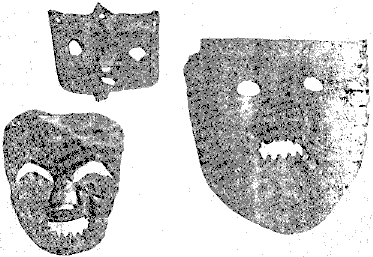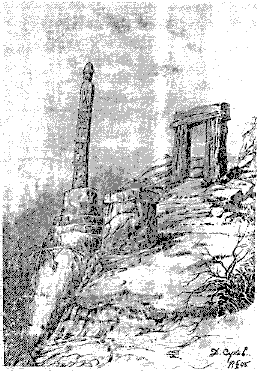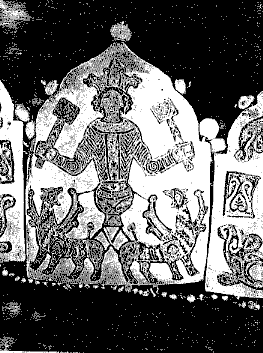

Behind a large mountain Beside a swift river Within a dark forest, Big bonfires are lit. On benches around the fire, These benches made of oak, Men of reknown on these benches seated Famous men, beautiful ladies Sing Kolada's songs. The Old Man in the center, seated Grinds his knife of iron; Boiling hot, boiling With the goat nearby... The time of sacrifice for the goat. (From an ancient song)
 This second holiday is for the worship of our ancient ones, our ancestors. On
this day, the Goddess of Crying and Wailing is honored. "...Put water on the
table. Let refuse be burned near the gates on Great Thursday, and declare:
'Walking here near this fire, the spirits have warmth'.
This second holiday is for the worship of our ancient ones, our ancestors. On
this day, the Goddess of Crying and Wailing is honored. "...Put water on the
table. Let refuse be burned near the gates on Great Thursday, and declare:
'Walking here near this fire, the spirits have warmth'.
 "When the people of Novgorod were notified that Dobrinja wanted to Christianize
them, they held a "Veche" (Thing) and decided to swear an oath: 'Do not let
Dobrinja into town. Do not let our idols be destroyed.' Dobrinja sent word to
them offering them silver, but the people refused him and would not let him
enter the city." The highest Volvh under the direction of a Slavic Pagan Priest,
named Bogomil, (also known as Nightengale or "Solovey"), Voevoda Ugonay goes on
to declare, went about the city on a horse, declaring with a loud voice: 'Better
for us to die than to let our Gods see disgrace.' However, Dobrinja prevaled
and each of the idols were cast into the river and the wooden sculptures were
incinerated. This, truly, was a day of great mourning and sadness for the Pagan
People..." - Iokimovskaja Letopis
"When the people of Novgorod were notified that Dobrinja wanted to Christianize
them, they held a "Veche" (Thing) and decided to swear an oath: 'Do not let
Dobrinja into town. Do not let our idols be destroyed.' Dobrinja sent word to
them offering them silver, but the people refused him and would not let him
enter the city." The highest Volvh under the direction of a Slavic Pagan Priest,
named Bogomil, (also known as Nightengale or "Solovey"), Voevoda Ugonay goes on
to declare, went about the city on a horse, declaring with a loud voice: 'Better
for us to die than to let our Gods see disgrace.' However, Dobrinja prevaled
and each of the idols were cast into the river and the wooden sculptures were
incinerated. This, truly, was a day of great mourning and sadness for the Pagan
People..." - Iokimovskaja Letopis
